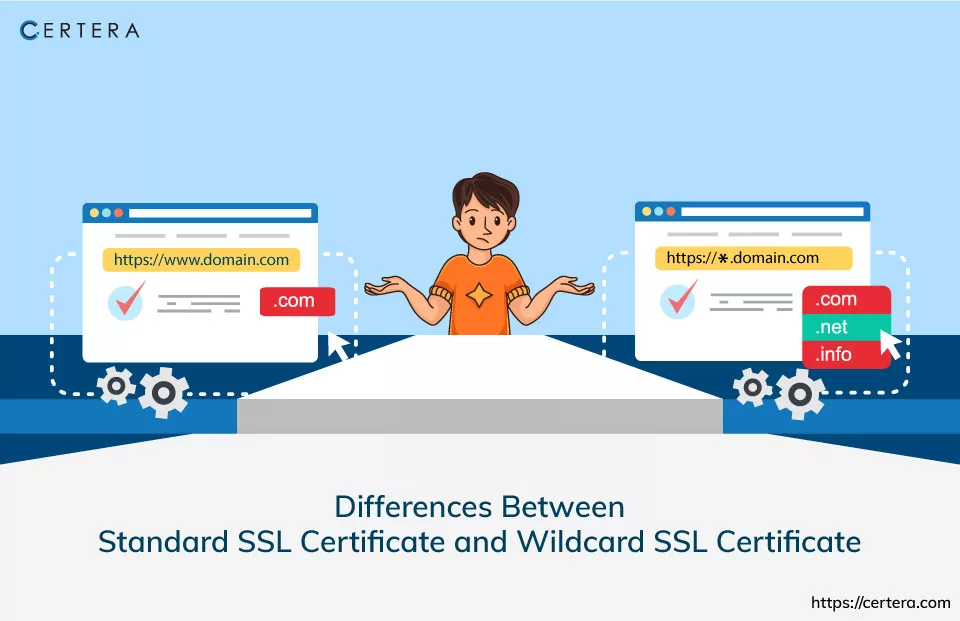Standard SSL vs Wildcard SSL Certificate: Key Difference

Before 2018, the transmission between the server and the client (browser) was in plain text format, which an eavesdropping third party could easily read. It was a severe problem in the context of – online banking, personal data privacy, etc. Hence, to overcome this, Google made it mandatory for all websites to use SSL (migrate from HTTP to HTTPS).
SSL is a protocol that transforms the transmitted plain text data into ciphertext so that it becomes unreadable for anyone except the party with the matching key. To enforce this protocol, you need to –
- Get an SSL certificate issued by a trusted CA.
- Install it on your server.
- Configure your site to make HTTPS connections.
After successful configuration, your website will display trust indicators (an additional “S” in the address bar and a padlock icon in the URL) that will act as visual proof, guaranteeing users the security of their data.
But is it uncomplicated to pick a perfect SSL certificate from the diverse types of SSL certificates available in the market? The answer to this query will be a big “No.” To get a perfect SSL cert, you need to consider “n” number of factors such as the number of domains and subdomains you want to secure, the CA you want to go with, the type of validation you want to opt for, etc.
So, if you are planning to buy an SSL certificate but facing the most common dilemma of choosing the appropriate one between Standard vs Wildcard SSL certificates, you are at the right place! In this article, we will explore – the technical differences between these SSL certificates and comprehend which is the best SSL certificate as per your requirements.
What is a Standard SSL Certificate?
A Standard SSL certificate, also known as a Single-Domain SSL certificate, is designed to secure a single domain (non-WWW & WWW variations). In lay terms, by using this cert, you will be able to protect:
- www.standardssl.com
- Standardssl.com
Single-Domain SSL Certificates are available in three validation levels: Domain Validation, Organization Validation, and Extended Validation. This means that whether you want to secure an e-commerce website that deals with sensitive user information, an organization website that handles company data, or a simple content-based website, you can choose the level of validation that best suits your needs.
Features of a Standard SSL Certificate
Some of the notable features of a Standard or Single-Domain SSL Certificate are mentioned below:
- Trust Seal: Dynamic
- Reissuance: Unlimited
- Server Licensing: Unlimited
- Mobile and Web Browser Support: 99.99%
- Algorithm Standard: 256-bit Symmetric Encryption
- Domain Security FQDN: example_domain.com and www.example_domain.com
- Refund: 100% (If cancellation is made within 30 days of purchase.)
- Key Length: RSA Private key of 2048-bit or ECC (Elliptic Curve-based Cryptosystem)
- Trust Indicators: Company name and address within the browser, secure padlock, and HTTPS URL
What is a Wildcard SSL Certificate?
A Wildcard Certificate allows you to secure a primary domain along with its “n” number of associated subdomains. For example, a wildcard certificate for *.wildcardssl.com can secure:
- www.wildcardssl.com
- top.wildcardssl.com
- cheap.wildcardssl.com, etc.
However, it is not capable of safeguarding multiple levels of subdomains like:
- get.cheap.wildcardssl.com
- best.top_ten.wildcardssl.com, etc.
Wildcard SSL Certificates are available only in two validation levels: Domain Validation and Organization Validation. These certificates are equipped with a wildcard character, represented by the asterisk (*) symbol, strategically placed in the certificate’s common name or FQDN (Fully Qualified Domain Name) during its creation. This * symbol denotes the subdomain part of the domain name.
Features of a Wildcard SSL Certificate
Some of the notable features of a Wildcard SSL Certificate are mentioned below:
- Reissuance: Unlimited
- Server Licensing: Unlimited
- Mobile and Web Browser Support: 99.99%
- Trust Indicators: Secure Padlock and HTTPS URLs
- Algorithm Standard: Root size of 2048 – bits with SHA – 256
- Refund: 100% (If cancellation is made within 30 days of purchase.)
- Free Trust Seal: Dynamic/Static (Depends upon the type of validation level you choose)
- Domain Security: Non-WWW and WWW versions of a domain + Unlimited first-level subdomains
Similarities Between Standard and Wildcard SSL Certificates
Here are some of the similarities between Standard and Wildcard SSL Certificates:
- Free Site Seal
- SHA2 enabled
- Online issuance
- Unlimited reissuance
- 24*7 customer support
- Unlimited server licenses
- 30 days money-back guarantee
- 99% browser and mobile compatibility
- 256-bit CSR encryption and 2048-bit RSA encryption
Differences Between Standard and Wildcard SSL Certificates
Coverage Area
A Standard SSL certificate can secure only one primary domain or sub-domain of your website at one time. In comparison, a Wildcard SSL certificate can secure your primary domain and its unlimited first-level sub-domains with one single certificate.
Validation Type
You can obtain a Standard SSL certificate with any of three validation levels: DV, OV, or EV. In contrast, you can get a Wildcard SSL cert with only a DV or OV validation level.
Wildcard SSL is unavailable in EV type as they are incompatible due to different requirements. Wildcard SSL secures and verifies sub-domains automatically under the main domain, which doesn’t blend well with EV certificate requirements. Therefore, due to the high assurance level, EV certificates don’t support Wildcard SSL.
Recommended: What is a Wildcard SSL Certificate and How does it Secure Sub-domains?
Price
It is one of the most significant factors differentiating a Single-domain SSL certificate from a Wildcard SSL certificate. Single-domain certificates start from $3.99/yr and go up to $799.00/yr. Whereas Wildcard starts from $39.99/yr and goes up to $399.00/yr. The price depends upon the type of validation the user is opting for.
CSR Creation
For Wildcard SSL, generating a CSR is tricky, as you need to enter the “*” symbol accompanied by the domain name to allow you to add multiple sub-domains in the future. In contrast, generating a CSR for Standard SSL is simple; you just need to enter the domain name. There is no need to use the “*” symbol as no other sub-domains can be added.
Tabular Comparision
| Benchmark | Standard SSL Certificate | Wildcard SSL Certificate |
| Protects | Single Domain or Subdomain | Primary domain + Unlimited number of its associated sub-domains. |
| Validation Type | DV, OV, and EV | DV and OV |
| Price | $3.99/yr – $799.00/yr | $39.99/yr – $399.00/yr |
| Best For | Businesses that must secure a single website | Businesses that must secure a website along with its multiple subdomains |
| Example | www.example.com | www.example.com, best.example.com, etc. |
When Should You Purchase a Standard SSL Certificate?
You should purchase a Standard SSL when you want to secure a single domain with no subdomains. The reason being:
Cost: If you aim to protect a single domain, you can accomplish it by purchasing a Standard certificate available for only $3.99/yr. But, if you opted for a Wildcard cert, you will be paying $39.99/yr.
Utilization: If you purchased a Wildcard SSL, even though there was only a single domain to protect and you don’t have any intentions to add any subdomains in the future, then you won’t be able to fully utilize the potential of this cert and the amount that you invested in this will be a waste. Therefore, choosing Standard over Wildcard will be the best decision.
When Should You Purchase a Wildcard SSL Certificate?
You should purchase a Wildcard SSL when you want to secure a single domain and an unlimited number of its associated subdomains. The reason being:
Cost: Buying separate Standard SSL certificates for each subdomain can be expensive. For instance, if you have 25 subdomains, purchasing individual SSL certificates for each will cost around $74.75/year, which can strain your budget. Instead, opting for a Wildcard SSL certificate that costs only $39.99/year is better, saving you approximately $54.76/year.
Management: If you have a large sum of money and are considering buying Standard SSL for each subdomain, it’s worth considering the management overhead of multiple certificates. It can be quite challenging to manage all these certificates effectively. Therefore, a better option is to go for Wildcard SSL, which enables you to protect all the subdomains and primary domain using a single certificate, making SSL certificate management much more simple and easy.
Frequently Asked Questions
Let us take a look at some of the most common questions with reference to Standard and Wildcard SSL certificates:
What are the top Three Disadvantages of a Wildcard SSL certificate?
The top three disadvantages of a Wildcard SSL certificate are:
- Wildcard certificates are not available at the Extended Validation level.
- It is challenging to deploy these certificates on second and third-level subdomains.
- If even a single protected domain or subdomain is hacked, the malicious actors can easily access the other subdomains.
Is there any Disadvantage of purchasing a Single Domain SSL certificate?
The only limitation of Single-domain SSL certificates is the inability to encrypt multiple domains and subdomains. We have multi-domain (SAN/UCC) to secure multiple websites and a Wildcard SSL certificate to secure unlimited subdomains. Moreover, the SSL market offers a Multi-Domain Wildcard certificate that protects multiple domains and all their subdomains.
Is there any Disadvantage of purchasing a Standard Wildcard SSL certificate?
Standard Wildcard SSL certificates have only one limitation – they can only encrypt one domain and its associated subdomains.
Can we secure Multiple Domains and Sub-domains using a Wildcard SSL certificate?
No, you can only secure multiple subdomains using Wildcard SSL. If you want to secure multiple domains and subdomains, you must purchase a Multi-Domain Wildcard SSL Certificate.
Do you need to pay extra to add more Subdomains if using Wildcard SSL?
No, most Certificate Authorities, like – Certera, Comodo, Sectigo, etc., allow you to add as many subdomains as you want with no extra costs, as long as they’re on the same level. There are no hidden fees.
Where to Purchase the Affordable Standard and Wildcard SSL Certificates?
Certera is the place if you want to get these two certificates at an affordable price rate in the market. Single-domain SSL certificates are available at just $3.99/yr., whereas Wildcard SSL is available for only $39.99/yr.
Conclusion
Deciding which one to choose from among these SSL certificates finally depends on what type of domain you need to secure. If your answer is a single website or domain, a Standard SSL certificate is the suitable option, whereas if your answer is a domain with “n” number of associated subdomains, then a Wildcard Certificate is an appropriate choice for your requirements.
